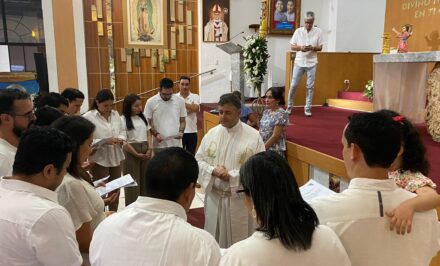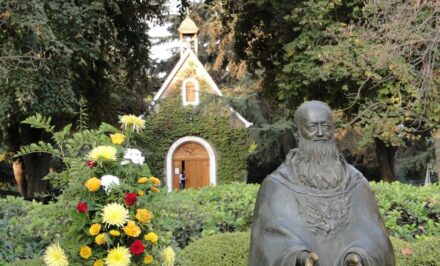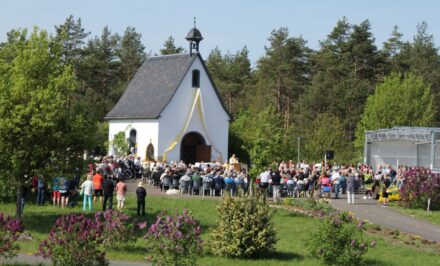 ROME, Fr. Oskar Bühler. Since 7 October the Bishops’ Synod has been meeting in Rome to discuss “the new evangelisation for passing on the Christian faith”. Among the more than 260 Synod members from all over the world there are three important representatives from the Schoenstatt Movement. Each has been sent by his Bishops’ Conference: Archbishop Robert Zollitsch DD, President of the German Bishops’ Conference and member of the Schoenstatt Institute of Diocesan Priests, Bishop Catalino Claudio Giménez Medina, President of the Bishops’ Conference of Paraguay and member of the Schoenstatt Fathers. Our Holy Father appointed Fr Heinrich Walter, Superior General of the Schoenstatt Fathers and President of the General Presidium of the International Schoenstatt Movement as a member of the Synod.
ROME, Fr. Oskar Bühler. Since 7 October the Bishops’ Synod has been meeting in Rome to discuss “the new evangelisation for passing on the Christian faith”. Among the more than 260 Synod members from all over the world there are three important representatives from the Schoenstatt Movement. Each has been sent by his Bishops’ Conference: Archbishop Robert Zollitsch DD, President of the German Bishops’ Conference and member of the Schoenstatt Institute of Diocesan Priests, Bishop Catalino Claudio Giménez Medina, President of the Bishops’ Conference of Paraguay and member of the Schoenstatt Fathers. Our Holy Father appointed Fr Heinrich Walter, Superior General of the Schoenstatt Fathers and President of the General Presidium of the International Schoenstatt Movement as a member of the Synod.
So far the work of the Synod has been marked by the many personal comments of the members on the subject of the Synod. How, according to the ideas of the Bishops (and other members of the Synod), can we describe the “new evangelisation”? Just as the circumstances in the worldwide Church differ, so do the statements of the members. The way our Schoenstatt Synod members answered this question can be seen from the statements they presented to the plenary session, and which now follow.
Mary – Protagonist of a new Visitation
Already almost at the start of the Synod, on 9 October, Bishop Cladio Giménez addressed the Synod. His subject, “Mary, Bearer of the Word in the new evangelisation, protagonist of a new Visitation.” Starting with the Biblical story of Mary’s visit to Elizabeth, he saw this as an example of the new evangelisation. It is not by words, but by active assistance, that she “made it possible for a longer encounter to take place between Elizabeth and her family with the incarnate Word, and she did this in everyday life.” This visit of Mary to the house of Elizabeth is for Bishop Giménez “a simple model or paradigm for a new Church exercising a continual mission, which shows in a more motherly and more accepting attitude, and which is poorer and more ready to serve her children, on the way with the People of God, by teaching them how to live in community.”
Then the Bishop talked about today, “Today Mary is the main actor in a new ‘Visitation’ to the homes of our people.” He talked about the ready welcome given to her, “The people who go to the homes are made welcome in the parishes in which this form of constant mission is taking place.” Without mentioning the “continual mission” by name, the Bishop from Paraguay spoke about the Pilgrim Mother campaign in his country, and presented it as a way for the new evangelisation, “The incarnate Word goes from home to home. That is the image of the new evangelisation, the fruit of pastoral conversion: The Church goes as a mother towards her children who have scattered.”
The Family – Place and supporter of new evangelisation
On Saturday, 13 October, it was Fr Heinrich Walter’s turn. He had chosen as his subject “The family as the place and supporter of new evangelisation”. His fundamental statement, “If we take a long-range view, the Church in the West will have no future without the renewal of the family.” He spoke very realistically and objectively of the “virus of anxiety about the future” that infects the people of Europe. “The family as the basic cell of society is no longer taken for granted in the West.” It becomes increasingly clear, Fr Walter said, that people today have to see the family as a vocation. To found a Christian family means breaking away from society and following Jesus. It is a similarly profound decision as that to follow a religious vocation. What is needed is that all who want to found a family in this spirit have to be intensively accompanied by the Church. The family remains the foundation for practicing the faith. “Many families consciously follow this path and see their home as a house of God.”
When a parish has many such Christian homes, they will have greater vitality. Fr Walter quoted as a practical example the “Family Misiones” he had got to know in South America. Through emphasising the family, the Church is also animated by the smallest cell. “If these cells die, many other things won’t help.” The witness of love and faith from person to person in everyday life is “the humus from which the liturgy, the sacraments and catechesis can bring forth their fruits. It is easier for vocations to the religious life to grown on such ground.”
Secularity as a challenge and opportunity for new evangelisation
Archbishop Zollitsch presented his statement on the afternoon of 15 October. His subject harked back to the academic Congress that took place in Schoenstatt during the week of Pentecost with a view to the Bishops’ Synod. It had been initiated by Archbishop Zollitsch, who was also its patron. The title of the Congress was: “Secularity as a challenge and opportunity for new evangelisation”. In contrast to many very one-sided and pessimistic voices that dwelt on the phenomenon of secularisation, Archbishop Zollitsch saw it also as an opportunity, and hence a challenge for new evangelisation. Secularisation and modernisation are the result of long-term developments (“not only since the 1960s) in the countries of central and western Europe. Specific upheavals and changes are connected with these developments, in particular in the field of religion. “In world history secularity is a unique process that has taken place in the developed industrial societies, and, according to the Canadian philosopher of religion, Charles Taylor, it does not simply mean the decline of the practice of the faith and knowledge of the faith … or even a disappearance of religion from public life. On the contrary we are dealing here with a profound process of transformation of fundamental life-experiences in that individuals do not simply accept tradition, but are challenged to decide personally.”
Archbishop Zollitsch sees this challenge to decide personally as an opportunity for new evangelisation. “The secular era that characterises Western Europe creates a radically new situation in which personal choice almost becomes an imperative.” The search for meaning, which often seems to be buried, shows in events that are connected with profound shocks. He quoted 11 September 2001 as an example, the Tsunami of 2004/5 and the killing spree in Erfurt in April 2002. “Events show that there is an ultimate depth in people – even if it is buried or hidden – that has not disappeared in the general climate of secularity. … In people there is an inner core of longing for meaning, which has not died in modern life, but is covered over and drowned, and which constantly makes itself felt.”
Against this background the Archbishop defined the task of new evangelisation as, “helping people to uncover the water veins of faith. To be their companions on the way, helping them to discover God’s traces in everyday life. … What matters above all in this common search is to allow people to experience through the way we are that God loves unconditionally, that God loves each individual person selflessly.”
The Bishops’ Synod will continue until 28 October. Its findings will be summarised in a post-synodal document which our Holy Father will publish in the coming months (or years).
The Vatican homepage – www.vatican.va – gives summaries of the individual statements.
Translation: Mary Cole, Manchester, England













